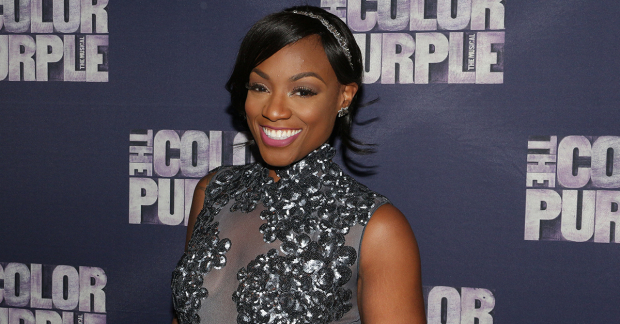Interview: Genius: Aretha Star Patrice Covington on Meeting the Queen of Soul and Playing Her Sister
Covington stars as Erma Franklin, originator of the song “Piece of My Heart,” in the new National Geographic series.
When Patrice Covington was on Broadway in John Doyle's revival of The Color Purple (playing Squeak), she got to meet Aretha Franklin backstage when the music icon went to see the show. Covington, a lifelong fan, never expected that a few years later, she'd be playing Franklin's sister Erma in a television series about the Queen of Soul's life. Erma Franklin is one of the regular characters in National Geographic's new series Genius: Aretha, and a legend in her own right, albeit one who's much less well-known. Erma, also a performer, was the lead singer on the original, pre-Janis Joplin version of "Piece of My Heart," and a backup singer on her sister's massive hit "Respect."
Covington was in Las Vegas, on tour with Christina Aguilera, when she got the call to submit a self-taped audition for Genius: Aretha, and the rest is history. Now, after having done the show, she's also preparing her own cover single of "Piece of My Heart," and reveling in her first major TV experience at the same time.

(© David Gordon)
I really didn't know much about Erma Franklin, and I had no idea that she's the original singer of "Piece of My Heart."
I never in a million years would have known it was her. The person who gave me the first bit of information about that was Allee Willis, who did the music for The Color Purple, which I was in on Broadway. I was doing some work in Los Angeles and she goes, "You know, she did 'Piece of My Heart'," and I had no idea. That began my research. There's not a ton about her on the Internet, but I was able to learn about her relationship with her sister through what was taught to the writers of our TV show and what was shared with them about the family. They were all super influential to each other, and Erma was a wonderful talent of her own, and a very hard worker.
Erma was equally as talented as her sister, and her voice was just as beautiful. The difference was that she didn't have the machine [behind her], and the machine is what I call their father, C.L. Franklin. Erma Franklin went on to have a record deal as well, but it just didn't stick. But Aretha knew that she could not have had this career, had this life, without her sisters. Family was a big deal for them. Family kept the secrets; family kept her together when she was going through very tumultuous times.
I've read that you had met Aretha briefly when she was in the audience for The Color Purple. What was that experience like?
I was floored by her graciousness and her openness to sit and meet all 20 of us one by one, and take a picture with all of us, and have something to say about every last person. It's clear she loved art and she loved the art that we performed that night onstage.
When I walked up to her, she said, "You were the one in the yellow dress." "Yes, ma'am." She goes, "You can sing!"
That must have been the thrill of a lifetime.
It was. Having the actual Queen of Soul, a woman whose music has been the fabric of my life, affirm my talent was just what I needed at that moment. I didn't know I ever needed it, but it was everything.
What was the experience filming Genius: Aretha like for you? It's your first big TV show.
This was my first television experience, literally, outside of promos for Broadway shows. To be guided by Courtney B. Vance, who played our father, and Pauletta Washington, who played my grandmother—they were just lovely, and it taught me how to be on TV. And I learned so much. And because of COVID, I went through everything that could happen on a set all at once. So I'm ready. You can bring on whatever you want for the next production!
What do you want people to take away from watching this story of Aretha and her sisters?
That love conquered all, and women can do everything. We can do it all at once. This is a wonderful time for that story to be told. I love that Aretha was not just a singer. She was an activist, and not just through her music, but she was an activist out in the streets, marching, making her speaking voice heard, and putting pen to paper to make changes in the world, with her father, with Martin Luther King, with her sisters. There's so much that we can do through our art if we let it.







